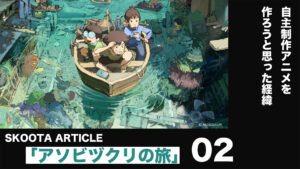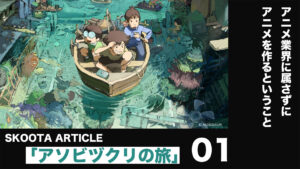
この記事はポッドキャスト番組として、以下のメディアで聴くことができます。
ゲスト、パーソナリティ
ゲスト:room6木村まさしさん
1972年生まれの50歳 コンピューター系の専門学校を卒業後、ゲーム業界を目指すも入社できず、業務系のエンジニアに。2007年に発売されたiPhoneに触発され、iPhoneの開発がしたくて2010年に独立し起業。ゲーム開発もiPhoneで出来る事がわかり、スマホ向けのゲームを2013年頃から開発する。
2015年ごろから国内外のインディーゲームイベントに多数出展、2017年頃よりNintendo Switch向けのコンソールゲームの開発を始める。イベントで知り合った開発者との御縁で2019年よりインディーゲームパブリッシャー業を始める。2020年には世界に浸れるゲームを集めたインディーゲームレーベル「ヨカゼ」の運営を始める。
パーソナリティ:迫田祐樹
通信会社、総合広告代理店を経て、アニメ企画&制作会社を起業し、MV〜映画の映像プロデュース。2021年に京都に移住し京都のエンタメ産業の盛り上げにも着手。直近ではマンガやオーディオのエンタメ領域にも従事。オーディオドラマ、webtoonの企画&制作中。加えて複数のエンタメ会社のプロデューサーやアドバイザーをつとめる。
全体の目次
#01
・ゲーム業界を目指していた学生時代だったが…
・業務系エンジニアの日々
・iPhoneの登場とゲームへの思いの再燃
・world for twoの音楽を作られている椎葉大翼さん
・インディーゲームにおける音楽の重要さ
・音楽、シナリオ、グラフィック、ゲームシステムが大切
#02
・様々なライフイベントを経て、独立起業へ
・インディーゲームイベントへの出展参加から加速するゲーム開発へのモチベーション
・京都の出町柳の風情のあるオフィスにて ・ゲームとマネタイズについて ・辛いときにアニメからもらった栄養 ・ゲームが面白くなる最後のひと頑張り ・テストプレイヤーの重要性とジャッジの難しさ
#03
・映像のメディアフォーマットはリニアなメディアだが、ゲームは…
・インタラクティブ要素があるゲームは複雑系の極地
・踏まえた上でのroom6、ヨカゼレーベルが提供したいもの
・hako生活さんとの出会いはピクセルアートイベント
・2019年から始めたパブリッシャー事業
・自分の子供にように大切にゲーム作品を作る
・幻影APの開発はクリエイターの共創が素晴らしくよく進んだ
・最新作はできたときがリリースする時
#01が始まります
ゲーム業界を目指していた学生時代だったが…
迫田
今日は木村さんに事前にいただいた自己紹介があるんですけれども、それが非常に面白い経緯になっていたので、それを一つ一つピックアップしながら、木村さんにこの時どうだったのか?みたいな話をどんどん元にしていければいいかなと思っております。 よろしいでしょうか?
木村
はい、それでお願いします。
ゲスト:room6木村まさしさん
1972年生まれの50歳 コンピューター系の専門学校を卒業後、ゲーム業界を目指すも入社できず、業務系のエンジニアに。2007年に発売されたiPhoneに触発され、iPhoneの開発がしたくて2010年に独立し起業。げーゲーム開発もiPhoneで出来る事がわかり、スマホ向けのゲームを2013年頃から開発する。
2015年ごろから国内外のインディーゲームイベントに多数出展、2017年頃よりNintendo Switch向けのコンソールゲームの開発を始める。イベントで知り合った開発者との御縁で2019年よりインディーゲームパブリッシャー業を始める。2020年には世界に浸れるゲームを集めたインディーゲームレーベル「ヨカゼ」の運営を始める。
迫田
コンピューター系の専門学校をご卒業されて、ゲーム業界をこの時期目指されていたが入社できずに、ということが書いてありますね。
木村
そうですね。子供の頃からゲームが大好きで、主にパソコンのゲームばかりしていました。本当にずっとゲームばかりしていました。で、昔はベーシックというプログラミング言語で、ちょっとしたゲームを作ったりしていました。
自分はずっとプログラミングを学んで、ゲーム会社に入りたいと思っていましたが、当時は就職氷河期で、ゲーム業界も今ほど求人も多くなかったので、本当に入りづらく。大阪の格闘ゲームを作っているCから始まる会社に応募して、ある程度まで進んだのですが、残念ながら入社できず、普通のエンジニアの仕事を始めたという感じですね。
業務系エンジニアの日々
迫田
自己紹介には業務系エンジニアって書いてあったんですけど、ちなみにこの業務系エンジニアっていうのはどういう内容なんですか?
木村
そうですね、まあ、これは本当に受託で、この企業内の一般的なシステムや銀行の勘定系システムなど、様々なものを作りましたが、ウェブ系やテレビ局の編成システムなど変わったものも作ったことがあったり、あと銀行系やネットワークセキュリティ系などです。うん、なんかいろんなシステムやりましたね。
迫田
1990年代…とかですよね、多分。
木村
そうですね。あの、いわゆる2000年問題に直面して、1999年の大晦日は泊まり込みで過ごしたんです。一応パソコンの前で様子を見守っていました。
迫田
なんか2000年問題を実際に業務で迎えれるっていうのが、ずっとこう話のネタにになりますよね。ちなみに専門学校ではゲーム用の勉強をされてたんですか?
木村
その頃は、ゲームのプログラミングの専門学校がなかったので、普通にコンピュータープログラムを学んでたんですけど、自分で既に勉強していたため、専門学校で学ぶことはあまりなくて。あまり面白くなかったですね。現在は、多くのゲームの専門学校があり学べることが多いですが、30年前にはそういう学校はあまりなかったですね。
迫田
なんかキャリアのつくり方もやっぱこうあんまり見えてないじゃないですか。ネットでばんばん調べて出てくるという時代でもないじゃないですから。まあなんかとりあえず専門学校に行ってみてとか大学に行ってみて考えるしかないですもんね。
木村
そうですね。僕はプログラミングしかやろうと思ってなかったので、その目的で専門学校行ったって感じですね。
iPhoneの登場とゲームへの思いの再燃
迫田
なるほどですね。1990年代から業務系エンジニアをやる中で2000年問題を迎え、ちょっとジャンプして2007年にiPhoneの登場ですね。これがメディアに与えたインパクトがめちゃくちゃ大きいと僕もよく比較で出すんですけど。木村さんもこれに触発されて…?
木村
そうですね。本当にびっくりしまして…。特に、皆さんご存知のように、スティーブ・ジョブズが最初のiPhoneのデモを行った時は。私はその頃、UI/UXデザインに特化した仕事をしていたので、少し興味を持っていましたが、iPhoneが登場してもうホントに衝撃を受けました。これは本当に素晴らしいデバイスで、世界が変わると感じました。そこで、自分もこのようなことをやってみたいと思い立ったんですが、当時の会社は非常に保守的で、社長に相談しても、やらないと断言されまして。なのでじゃあ辞めて自分でやります、という感じです。
迫田
その感覚はすごくわかります。あのiPhone 3Gが出たあたりって、多分2、3年の間はこんなものが流行るわけがないと言われていて。iモード全盛期やガラケー全盛期で、こんな使いづらいもの(スマホ)はこのまま普通に流行るわけがないってずっと言われ続けていた時期がありましたよね。だから、独立して開発するっていいう意思決定はいいと思いますね。ここからつながっていくのかなと思うんですけど、専門学校を卒業した木村青年はゲーム業界を目指すもゲームに関わることなく10年〜15年が経ち、だけど、ずっとその燃えているゲーム熱はずっとあり、そこでこのiPhoneが出た時に、本格的なゲーム開発ゲームに繋がったんですか?
木村
いや、あの最初はね、そこは繋がっていなかったんですよ。最初は普通にその業務系のつながりというか、前に繋がりあったところからお仕事をもらってやってたわけなんですけど、まあ、あのいろいろ調べるとiPhoneでそのゲームを作るフレームワークがあるんだといういうことを知りまして、昔はゲームを作るって本当にいわゆるC言語でもひたすらゴリゴリと書くなんて、すごいハードルの高い作業だったんですよ。だけど、あのiPhoneのフレームワークを使えば、一人でゲームが作れるみたいなことを知ったのでこれはやるしかないでしょうと。と言うことでそこでちょっと起業して少し経ってからゲーム作りを始めたんですよね、そこからが一応スタートし始めたのですが、まあでも作ったことはもちろんないので、もう全然右も左もわからず、というこ感じでした。最初の一本はもう全然でして、本当にあのなんかゲームっぽいものができたっていうところぐらいで。
迫田
そのタイミングでiPhoneのフレームワークを使ってほぼ一人で?
木村
そうですね。えっと、2,3人のチームで作っていたんですけど、僕はサーバーサイドと企画の方面でも関わっていて、それから全体をまとめるような役割も担いました。私もエンジニアとして企画や設計の人間でしたので、ゲームの設計からも関わっていまして、最初に作ったのは、位置ゲーというジャンルでした。すごく壮大な位置ゲーを作ろうとしてたんですよね。
迫田
やっぱりそのiPhoneのGPSとかうまく利用して…?
木村
そうです。機能を使って、一発目に作るにしては、ちょっと壮大すぎて、もちろん作れなかったというか、結局全然完成しませんでした。
迫田
いやー、2011年の木村さんの位置ゲームを作るにおいての葛藤を聞いてみたくてめちゃくちゃなっていますが、脱線しすぎてしまうのでまたどこかで聞かせてください。僕はiPhoneを持ったのは2008年頃でしたが、GoogleマップやGoogle Earthが手元の携帯で使えるようになったことに感動しましたが、iPhoneの衝撃という意味では「セカイカメラ」というアプリがあったことを思い出します。iPhoneをかざしていろんな場所にタグを置いていくことができるというアプリで未来を感じました。だから、位置ゲームでなにかやろうということを考える気持ちが凄くわかります。
木村
ですです。まさにセカイカメラとかあの辺を見て作ろうと思ったんです。あのときはすごかったですよね、という話をするとまた長くなっちゃうので笑
迫田
なるほど。では、そのようなことを考えながらも、2010年から独立してまずは3人のチームでゲーム開発を始めたと。その動きが現在につながっていってますか?
木村
んーまあ、僕としては本当にとっかかりで、なんとなくゲームって作れるんだなーって思ったぐらいだったんですけど、その後、また社員が入れ替わったりとかして、2013年頃から再び「ゲームを作ろう」という熱が復活して、本格的に会社の中で作り始めました。今までは業務の傍らで趣味みたいに作っていた感じでしたが、2013年頃からはリリースするまでやろうと決めたという感じですね。
迫田
あ、そうなんですね。じゃあ、やっぱりそのいろいろ紆余曲折あったけれども、ゲームというクリエイティブを目指す気持ちがずっとあって、その背中を押してくれたのがiPhoneだったっていうところかもしれないですね。
木村
そうしれませんね。もう完全にiPhoneですね〜。まあ、ちょうどその頃はiPhoneやAndroid向けの個人でゲーム開発している個人ゲームクリエイターがすごく増えた時期だったと思います。まあ、そういう波にもちょっと乗った中で整ったかなという感じですね。
迫田
いやー、いろんなクリエイターの人生を変えたのがiPhoneですね。すごいデバイスですよね。作り手の人生を変えていくデバイスっていうのはなかなかありませんし、幅広くソフトウェア・ハードウェアの両面で変えていくというのは、本当にすごいことですよね。
World for Twoの音楽を作られている椎葉大翼さん
迫田
じゃあ、ちょっとこのあたりでいったん曲を一本挟めればとおもいます。この曲は木村さんからまさに今作られているゲームにも関係もするのかなと思うんですが。
木村
はい、そうですね。はい、一曲目なんですけど、ちょっとまあ、あの手前味噌といいますか、弊社でパブリッシングしてるゲームタイトルの曲になりますが、椎葉大翼さん作曲の『夢想曲』という曲をお届けしたいと思います。よろしくお願いします。
迫田
はい、お聞きいただきましたのは椎葉大翼さんの夢想曲でした。この『夢想曲』のエピソードだったり、椎葉大翼さんのエピソードで何かございますか?
木村
そうですね。はい、椎葉大翼さんはもともと任天堂にいらっしゃって、様々なゲーム音楽を手がけられていました。退職された後は、ゲーム音楽の作曲家として活躍されてますが、ご縁があって長い間、弊社のゲームの曲をお願いしておりまして、その中でも『world for two』は特に素晴らしい曲だと思います。椎葉大翼さんは生音で音楽を作ることを得意としている作曲家さんでして、特に弦楽器が素晴らしく、僕も初めてバイオリンや弦楽四重奏の演奏を聞いた時、その世界にドハマリしちゃったということで、ずっと椎葉大翼さんには音楽をお願いしているという感じになります。
迫田
へぇー。ちょっと深掘りさせていただきたいんですけど、まずは弦楽四重奏だったり、生音っていうものがインディーゲームの音楽で使われるのって結構珍しいんじゃないかなと思っていてまして、そのなんかビットいうか、そのパソコンで打ち込んだようなものがやっぱりインディーゲームっぽい記号だったりするじゃないですか?
木村
そうですね、ピコピコサウンド。チップチューンと呼ばれるものでして、僕もすごく好きです。確かに多くのゲームがチップチューンの音楽を採用していると思います。生演奏の音楽はほとんどないんじゃないかな、インディーゲームの中では。コストもかかるし、結構面倒だとも思います。
インディーゲームにおける音楽の重要さ
木村
生音って撮り直しも大変ですから、まぁどちらかというと、ぼくはもう音楽を主体といいますか、ゲームに音楽を合わせるのではなく、まず音楽を録音してそこからゲームを音楽に合わせるみたいな感じで。結構音楽主導で扱っているところもあります。
迫田
その音楽合わせの作り方って、例えばアニメで考えても珍しいんですよね。先に声優さんに声を入れてもらうプレスコと呼ばれるものもありますが、それですらめちゃくちゃ珍しいですね。ゲームでも、音楽が先に着想があって、そこからゲームの世界を作っていくのは比較的珍しいのではないでしょうか。
木村
そうですね。でも、並行して進めるところもあるかもしれません。もちろん、こちらから依頼して曲を作ってもらうことはありますが、完成した曲はその時の一発撮りなので、大切にしたいと思っています。仮に曲がゲームに合わなかったとしても、なんとかゲームのほうを合わせて調整するみたいな感じで。ただ、生演奏の力は本当にすごいので、できれば生音で録音したいと思っています。これは本当に大事にしたいと思っています。
迫田
でもほんとそうですよね。そのなんというか、生音で取る場合って、やっぱそのスタジオを用意して、オケを用意して、そしてそこでのコミュニケーションも含めたトータルの技が必要になりますよね。それを、実施できるアーティストの方って特にインディーゲーム業界だと少ないですよね?
木村
そうですよね。うん、おそらく椎葉大翼さんだけなのかもしれないですけれども。いや、でもまあ、本当に音楽はやっぱりすごく大事にしてますね。
迫田
僕もroom6さんのゲームをプレイさせてもらって、あ、「ヨカゼ」ブランドのものなんですが、後ほど「ヨカゼ」ブランドの説明もどこかで入れたいと思うんですけど、そこのタイトルをプレイしていると音楽を聴きに行く感じがあるんですよ。ものすごい音楽が占めている世界観醸成があって。だから今の木村さんの話を初めて聞いて、やっぱり音楽のウエイトがめっちゃ強かったんだっていうのがお聞きできてよかったです。
木村
すごく昔にプレイしたゲームとかでも、ゲームのルールを忘れていても音楽だけは覚えていることがよくあると思うんですよね。なんで音楽はずっと残るんだろうなあって思うことがあります。僕の中にはそういう経験があって、なんで音楽は絶対にケチれないと言いますか、まあ、すごく大事にしないといけない要素だと思っています。
迫田
音楽ってその、パブロフの犬じゃないですけど、やっぱ聞くと瞬間的にその時の風景や感情がすっと返ってくるから。
木村
そうなんですよねぇ。なのでもちろんゲームの内容ですとかグラフィック、シナリオっていうのはもちろん大事なんですけども音楽も大事で。まあ、ここは三本柱ですよね。
迫田
ちなみに三本柱っていうのはをあえて言語化すると?
音楽、シナリオ、グラフィック、ゲームシステムが大切
木村
あっ、三本柱じゃなくて、四本柱なのかな?音楽、グラフィック、シナリオ、ゲームシステムですかね。その中でも音楽は非常に重要だと思います、僕の中では。ですので他のゲームタイトルでも、音楽にこだわっているものが多いです。
迫田
なるほどですね。エピソードの後半は木村さんのキャリアの途中から、現在音楽について話が移っていますが、更にお聞きしていきたいと思います。先ほど話したことについてはありますが、音楽が印象的なインディーゲーム、あるいはコンシューマーゲームのビッグタイトルなど数多くあります。インディーゲームの場合、音数が少ないことが記号性を出すことに寄与していると思います。
僕も『ゼルダの伝説』、『ドンキーコング』、『聖剣伝説』、『クロノトリガー』などの音楽を覚えています。最近、デビッド・ワイズのインタビューを見て、ドンキーコングの曲を作った方法について話していました。彼は、まず良いビートを作ることが重要だと言っていました。良いビートがあれば、自然に音が付いてくるということです。ビートはその世界観にも直結するため、非常に重要だと思いますが、音楽において、木村さんやroom6さんがどのようなこだわりを持っているか、改めてお聞きしてもいいですか?
木村
そうですね。まぁ僕自身はあの作曲家ではないので、基本的にはもうお任せなんですけど、やはり世界観が大切ですよね。うちのゲームは世界観をすごく大事にしているため、プレイヤーにその世界に没頭してほしいという思いがあります。そのため、作曲家さんと他のスタッフとは常に世界観をどう音楽に乗せるかを話し合っています。





